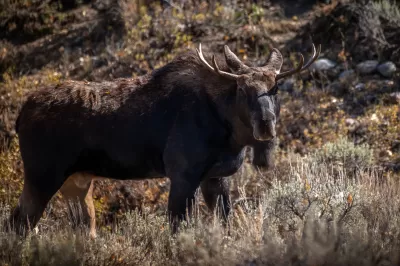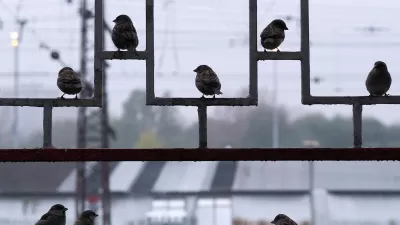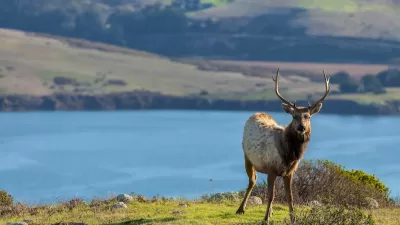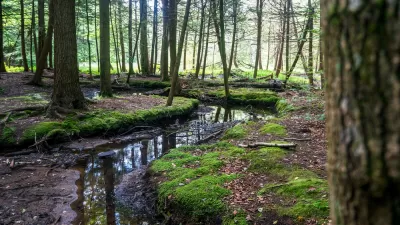Overly loud noise isn’t just a public health risk for humans.

A new study being conducted in the Bridger-Teton National Forest in Wyoming is finding that “the mere presence of human sound, no matter how loud or quiet, fast or slow, changes how animals behave.” Christine Peterson describes the new research in High Country News.
“For some species, hikers and bikers may be little more than a sideshow in a forest full of natural disturbances. For others, recreationists could have an impact similar to that of terrifying predators, invading habitat where food can be found, resulting in lower birthrates and even increasing deaths.”
While “non-consumptive recreation” such as hiking may seem harmless, “recent studies show otherwise. There’s one out of Vail, Colorado, showing that increased trail use by hikers and mountain bikers disturbed elk so much the cows birthed fewer calves. Another out of Grand Teton National Park showed that backcountry skiers scared bighorn sheep during winter when food was scarce, with potentially lethal consequences.”
The study is designed to assess what types of noises cause the biggest reactions in animals. “Judging by an initial analysis of last summer’s data, large groups of mountain bikers were the most likely to cause animals like mule deer and elk to flee.”
FULL STORY: When the Woods Get Noisy, the Animals Get Nervous

Manufactured Crisis: Losing the Nation’s Largest Source of Unsubsidized Affordable Housing
Manufactured housing communities have long been an affordable housing option for millions of people living in the U.S., but that affordability is disappearing rapidly. How did we get here?

Americans May Be Stuck — But Why?
Americans are moving a lot less than they once did, and that is a problem. While Yoni Applebaum, in his highly-publicized article Stuck, gets the reasons badly wrong, it's still important to ask: why are we moving so much less than before?

Research Shows More Roads = More Driving
A national study shows, once again, that increasing road supply induces additional vehicle travel, particularly over the long run.

Judge Halts Enforcement of Anti-Homeless Laws in Grants Pass
The Oregon city will be barred from enforcing two ordinances that prosecute unhoused residents until it increases capacity and accessibility at designated camping sites.

Advancing Sustainability in Los Angeles County Schools
The Los Angeles County Office of Education’s Green Schools Symposium brings together educators, students, and experts to advance sustainability in schools through innovative design, climate resilience strategies, and collaborative learning.

Using Old Oil and Gas Wells for Green Energy Storage
Penn State researchers have found that repurposing abandoned oil and gas wells for geothermal-assisted compressed-air energy storage can boost efficiency, reduce environmental risks, and support clean energy and job transitions.
Urban Design for Planners 1: Software Tools
This six-course series explores essential urban design concepts using open source software and equips planners with the tools they need to participate fully in the urban design process.
Planning for Universal Design
Learn the tools for implementing Universal Design in planning regulations.
City of Moreno Valley
Institute for Housing and Urban Development Studies (IHS)
City of Grandview
Harvard GSD Executive Education
NYU Wagner Graduate School of Public Service
City of Cambridge, Maryland
Newport County Development Council: Connect Greater Newport





























